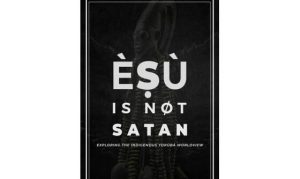
It is not out of place to say that indigenous African religions are widely misconstrued by both their people and those beyond the continent. This is evident in the numerous attempts by pro-foreign religionists to demonize the aboriginal deities of Africa.
ÈṢÙ Láàlú is one such victim of this adverse circumstance. Even more unfortunate is the betrayal by one of his own ‘progeny,’ Ajayi Crowther.
The demystification of Èṣù in the contemporary world has undoubtedly been a topical issue among several writers. While some uninformed individuals equate him with the devilish and malevolent Satan of the Christian religion or Shaitan in the Quran, others understand the vehement differences between the two. This belief that Èṣù is equivalent to Satan stems from a superficial comparison that fails to consider the nuances of Yoruba religion and the diverse worldviews across cultures.
It is important to understand that, according to Yoruba theology, Èṣù is one of the deities sent by Olodumare to the Earth. He is the custodian of primordial power and serves as one of the ministers of Olodumare. Èṣù is an important deity tasked with organizing and regulating the existential principles.

Èṣù is a god, much like other gods in Yoruba mythology, that bridges the gap between the mortal world and the divine, making offerings and prayers accessible to other deities. He can be described as a divine enforcer of rules and natural laws, akin to a cosmic police officer. He enforces repercussions and retribution.
Unlike the Biblical Satan, who rebelled against God as portrayed in the Bible, Èṣù is one of the ministers of Olodumare. He serves as an intermediary between humans and other divinities. The concept of Satan is generally characterized by most religions as the devil who tempts individuals away from the path of righteousness. In contrast, Èṣù is seen as a necessary part of the natural order, helping maintain equilibrium by testing individuals’ moral choices and guiding them through life’s challenges.
Would it not be unfair and illogical to say that Èṣù is Satan?
The Christian missionaries needed an equivalent of Satan, so they erroneously distorted the entire ethical structure of Èṣù. This action perpetuates misunderstandings about non-Western belief systems.
There is no biblical or Quranic name for Èṣù. Èṣù is Èṣù, and Satan is Satan, just as Jehovah is Jehovah. The translation error occurred decades ago by the Christian missionaries. Attributing only negative attributes to Èṣù and mischievously equating him with Satan, based on Western religious beliefs, reaffirms the unfortunate fact that African cultural values, traditions, and religions are often considered inferior by proponents of foreign religions, the Western world, and sadly, many modern Africans.
I urge the upcoming generation, particularly in Africa, to read and study books in order to gain an in-depth knowledge of our customs, traditions, and ancient intellectual sciences. I believe in the Yoruba adage that says “Bó pẹ́ bó yá, Akólòlò á pe baba.” ( Time will ultimately reveal the truths of every situations).
ÈṢÙ Ọlá Ìlú
ÈṢÙ Ọláoríoyè
ÈṢÙ Ọ̀dàrà
Onílé Oríta
‘Láfihán
Ọmọ Ẹlẹ́bọ tíí jorí ẹran
Onímí ń Ṣumí, ‘Láaróyè ń ṣù’fun
Ẹlẹ́kún ń sunkún, ‘Láaróyè ń s’ẹ̀jẹ̀
Èṣù má ṣe mí
Má sè’ran-àn mi.























